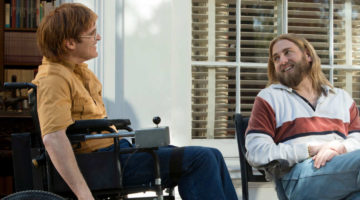Review: Godzilla
About a half-dozen movie allusions, three generations of a heroic family, two different narratives, and one massive star make up Godzilla, a satisfying and honorable installment in the iconic creature feature series.
Successfully removing the awful taste left in the mouth of fan boys and movie-goers alike from Roland Emmerich’s insufferable 1998 version, director Gareth Edwards updates and entertains, offering a bright future for the enormous lizard while regarding the well-worn path that brought him here.
Turning 60-years-old this year, Godzilla looks as young and strong as ever; you just have to wait to get a glimpse. Edwards spends for the first half of this thoughtfully and carefully crafted adventure focusing on a family plagued by unknown circumstances, digging as deeply as possible for real emotion.
Bryan Cranston certainly brings some levity and as expected, a great performance as a scientist on a lone and decided quest. Having lost his wife to a tragic nuclear accident, for which he was in part blamed, Joe Brody has holed himself up knowing in his heart something more sinister is at play.
His son Ford, meanwhile, has grown up mostly without a mother, and more or less without a father, finding his way in the military as a bomb expert, while starting his own family with his beautiful wife Elle and a son of their own. But no one is safe (like the Brodys in Jaws). A trip to Japan to help his dad out of jail finds father and son back to the scene of the original meltdown and face to face with the product of humankind’s hubris, carelessness, and ambition.
That is to say, they encounter a massive winged creature with electromagnetic powers that destroys the plant and takes off into the night.
Then Godzilla transforms. We move from a familial drama with hints of geopolitics to the real reason why you’re paying admission: monsters. It’s still an effectively grave and ominous film (every scene seems to take place at night, in the rain, or within a haze of fog), but a bit of humour and some well-placed jokes are implemented and more explosions ensue.
After all, we’ve massive creatures battling it out and taking down buildings.
Edwards, though, brings something to the table that is most impressive and it’s a rare trait that makes Godzilla so effective and impactful: restraint.
In other hands, this movie could have easily been thirty minutes longer, with a completely superfluous and gratuitous action sequence in which more bystanders die and another city is leveled. There is in part that element, but it’s that rare occasion where you are genuinely left wanting more instead of being exhausted by the excess of a loud and drawn out spectacle.
Even as the action unfolds, Edwards prefers it to be viewed from an obscured, almost voyeuristic place. Godzilla does indeed make a most impressive debut, but Edwards often returns the viewer behind car windshields, office windows, slowly closing doors and other distance spots from which to watch things play out. The suspense and mystique remains throughout; and yes we get to see our main attraction in full, crisp, coherent glory.
Fiercer but definitely instilled with personality and attitude, Godzilla visually is perfected updated, and the world in which he lives now winks and nods at the series of old films.
We’ve still white-coated ,scientists run in panic as sirens sound; characters say things like “I have to see this” and “Oh my God…” and a lone wise man believes that Godzilla can restore balance to the world. There are some cheesy remarks, and the film dips into a bit of melodrama, but it’s completely in tune with what Godzilla has been since its inception – it’s only missing the lip-dubbing.
It’s hard not to fall in love with this loving recreation of one of the biggest stars in film history. Godzilla is a wonderfully-realized, big-budget, finely-tuned B-Movie with a great cast and one very beloved star.
[star v=4]


